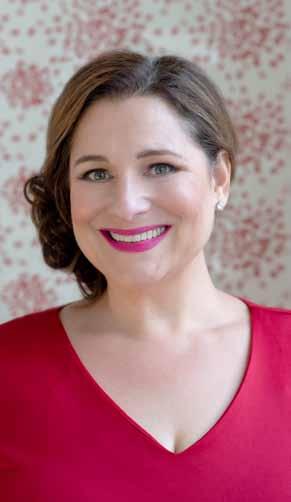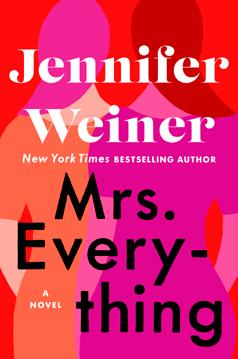
5 minute read
Mrs. Queen Village

Jennifer Weiner
Resident and writer Jennifer Weiner says all of her stories are Philadelphia stories
by Regina Colantonio
One of the many reasons to feel proud of living in Queen Village: we get to call bestselling author Jennifer Weiner one of our own.
Since 2007, Weiner has lived in a historic Queen Village home that was once a four-room schoolhouse, where she has produced a mountain of published work. Weiner’s neighborhood roots pre-date her current home; she tells people she has spent “25 years moving around the same block.”
Like many Philadelphians, Weiner knows how to hustle. She wrote her first book, Good in Bed, at night and on weekends while working as a features reporter at The Philadelphia Inquirer. Weiner continued to work at the Inquirer even after that debut novel was published in 2001 and she had two additional books under contract.
Over the next two decades, Weiner published another 15 books (all of which she wrote in Queen Village) and enjoyed massive success. Weiner’s books, one of which was made into a major film, have sold over 13 million copies and spent more than five years on The New York Times bestseller list. Not one to rest on prior triumphs, Weiner commits herself to writing in her Queen Village closet/office she dubbed her “cloffice” at a steady clip of about 2,000 words a day, but she makes time for writing breaks with piano lessons at Settlement Music School.
Weiner’s impact extends far beyond her published books. Over the past 10 years, Weiner has earned national notoriety for highlighting the underrepresentation of female writers in literary media, writers whose books were often ignored by major book review publications. Weiner also contributes sharp opinion pieces laced with her trademark humor to The New York Times.
Throughout her career, Weiner has relentlessly pursued and achieved her lifelong dream of making a living as a writer. But the deeper mission behind Weiner’s work has always burned brightly: the telling of women’s stories and proclaiming to the world that those stories matter. Weiner has no intention of letting up on that commitment anytime soon. Weiner’s latest book, Mrs. Everything, was published in June and is available at Head House Books.
QVC: You grew up in Connecticut and moved to Philadelphia in 1994 to work for the Inquirer. Why have you chosen to make Queen Village your home?
JW: Living in Queen Village gives me access to everything that Philadelphia has to offer. I can walk to get great wood-oven pizza at Stella or top-notch sushi at Izakaya, or incredible pastries and pasta at Fiore. I can go see a first-run independent film at one of the Ritz theaters and performances at the Arden and the Wilma and the Kimmel Center; I can walk to the Art Museum or the Barnes, if I’m feeling ambitious. But Queen Village still feels cozy and leafy and friendly, like a small-town neighborhood. That’s why I love it here.
QVC: What are a few of your most loved Queen Village places and businesses?
JW: Head House Books has been a touchstone of my Queen Village life since it arrived. I’ve done events there, attended events there, bought dozens of books for myself and my kids, spent hours with my younger daughter in the children’s section and watched her move from picture books to chapter books to YA. Fiore is a new favorite—I love the idea of all-day dining, and oh, those scones and cornetti. The [Headhouse] Farmers’ Market is a Sunday ritual, and I always come home with a bagful of produce and an armful of flowers. Some of my favorite dresses and skirts come from Eye’s Gallery (and if they don’t fit perfectly, Bobby Schorr’s makes it right). The folks at the UPS Store are unfailingly friendly and professional. And I’m at Rita’s every few days in the summertime, to cool off with a custard twist cone.
QVC: Philadelphians are people with tenacity, grit, and a willingness to speak their minds. To what degree do you think those qualities are inherent in you and to what degree can Philadelphia claim (with pride) some influence over the past 25 years?
JW: When I wrote Good in Bed (lo, these many years ago), I wrote about Philadelphia having the character of a sullen second sibling—the one Mom doesn’t love best. But that sibling tries harder! Yes, we are eternally in the shadow of NYC and

DC; yes, it’s been hard to shake “Filthydelphia,” yes, every time I go to Los Angeles, people ask me, “So, New York, right?” (And I say, “No, Philadelphia, because we’re actually allowed to live other places!”)
I like to think I’ve inherited some of Philadelphia’s grit and resilience. I know for sure that the whole no-respect thing feels like it landed squarely on my head. (If New York’s the real city, where real writers write real books, Philadelphia is where genre writers toil, to large readerships but very little critical regard.)
My books are Philadelphia stories. Even the ones that aren’t set here. They’re all about women who face down difficulty and learn to rise above; who learn and grow along the way and end up wiser and
hopefully happier than they were when their journey started, having learned that maybe they didn’t get what they wanted, but they ended up exactly where they were always meant to be. That, to me, feels like a very Philadelphia arc.
QVC: You have enjoyed such an incredible career. You are already at work on your next book. What else do you hope to experience or achieve? What excites you about the future?
JW: I’ve thought about this a lot. As my 50th birthday approaches, I read a piece in The Atlantic recently about how accomplished people handle the second half of their lives. There are people who are constantly trying to top their earlier achievements, which is a recipe for misery—what if you can’t? And if you do, what’s next— do you just keep setting the bar higher and higher? Then there are people who go through an evolution, and find meaning in teaching or in giving back.
I have been very lucky, and I really have accomplished a lot of what I wanted to do, as a novelist, as an opinion writer, as someone with a platform who’s tried to use that platform for good. If I was able to go back in time and tell my 12-year-old self what I grew up and became, I think she’d be pretty happy! So when I look at the next 20 or 30 years, I want to keep writing novels, and keep pushing myself in new directions; I want to keep writing opinion pieces, but I also want to find as many ways as I can to give back, to teach, and to nurture the next generation of female writers. I don’t want to share details yet, but I have some pretty big, exciting plans in the works for 2020, and I hope to announce them within the next few months. ■
This interview has been edited and condensed.






